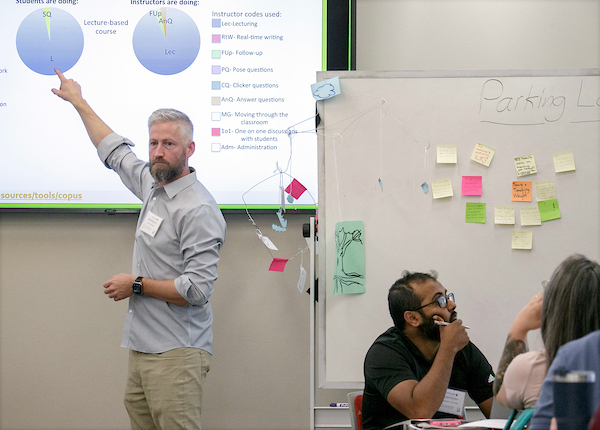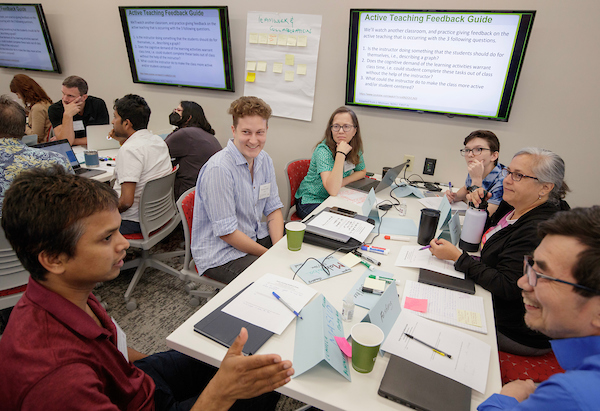UA Little Rock Faculty Embrace Strategies to Improve Teaching

UA Little faculty members learned about valuable teaching strategies to improve student success and retention in the classroom through active-learning techniques during the 2023 Mobile Institute on Scientific Teaching held May 15-19 in Ottenheimer Library.
The workshop provides a focus on active learning because studies show that students are 1 ½ times more likely to pass classes in active learning classrooms compared to students in classes that use traditional lecturing only.
Since UA Little Rock began offering the workshop in 2019, they have trained more than 125 people including more than 105 faculty members and 20 graduate teaching assistants. Dr. Mark Baillie, assistant professor of chemistry, is part of a national Mobile Institute on Scientific Teaching leadership group and has run workshops at 15 locations around the world.
UA Little Rock received a nearly $2 million grant from the National Science Foundation last year to enhance teaching, learning, and student success in undergraduate STEM education. One of the things the grant provides funding for is a stipend for up to 75 STEM faculty to complete the workshop over the next five years. The UA Little Rock Office of the Provost generously provided matching stipends for any non-STEM faculty who completed this year’s workshop.
Participants had a hands-on experience on the impact of evidence-based teaching approaches such as active learning and inclusive teaching practices, with deliberate practice and backward design. This workshop has been identified as a major transformative event in the career of many college faculty, from R1 institutions to community colleges.
“I was very interested in learning about other teaching techniques to improve the learning environment,” said Michelle Malone, digital learning specialist at Ottenheimer Library. “I’ve heard about the Mobile Institute on Scientific Teaching before, and I was excited to take it for myself. I wanted to learn more about the latest teaching practices.”
Malone was especially interested in learning about backward design, an approach to creating curriculum, subjects, and classes that prioritizes the intended learning outcomes instead of topics to be covered.
“I was able to practice backward design using lessons we plan to use in the next school year about open education and affordable learning practices,” Malone said. “The idea of having more engaged, experiential learning in the classroom is promising, and I am glad that so many people are taking this workshop.”
Scott Woolbright, an assistant professor of biology, has previously taken the workshop back in 2020 and was helping lead this year’s event as a facilitator. He led small groups of 4-7 faculty members as they learned about the backward design process.
“Coming back and being a facilitator of the workshop is extremely comprehensive,” Woolbright said. “I am retaining more knowledge, and it’s rewarding to facilitate and help other faculty members embrace these skills. I would encourage more faculty to attend this workshop.”
UA Little Rock professors collected data on teaching practices during the spring semester from some of the faculty who completed this year’s workshop. They will collect data again in a year to measure any changes in their teaching practices and classroom environments that result from their participation in the workshop or communities of practice in the fall.
Participants also learn about the importance of data collection in teaching, which provides educators with insights on how to reflect on what changes they make in order to improve over the years. They can also use this data to publish research, which is especially important to career success for tenured and tenure-track faculty.

“It’s something that every class needs to do – improve activity and active learning,” said Dr. Mariofanna Milanova, a professor of computer science. “It also stimulates the brain to participate in this workshop. We’ve had interesting exercises that encourage people to think in different ways. I will find this very useful in my classroom.”
During the final day of the workshop, Chancellor Christina Drale, Provost Ann Bain, and Deans Sarah Beth Estes, Lawrence Whitman, and Thomas Cliffton joined the participants for lunch to hear their thoughts on improving learning at the university.
“In this lunch session, workshop participants were able to voice their appreciation for support provided by the administration and also make suggestions for how to increase the likelihood that they and others would be able to increase the use of student-centered approaches on our campus,” Baillie said.
STEM faculty members who completed the workshop can continue to improve their teaching skills by participating in a Community of Practice – small groups of up to five faculty members who will meet bi-weekly to offer peer support and build out their expertise, another new UA Little Rock professional development program funded by the NSF grant.
“The grant also allows us to build out communities of practice for STEM faculty in the fall, where faculty from the workshop will meet every other week to receive support as they try to implement evidence-based practices into their classes,” Baillie said. “The grant does provide a stipend for these faculty participants.”
This year’s participants, named Scientific Teaching Fellows after completing the workshop, include:
· Amanda Trickey, assistant clinical professor, School of Nursing
· Amy Brown-Westmoreland, online program coordinator, eLearning
· Anita Neal, instructor, School of Social Work
· Arya Basu, assistant professor, Department of Computer Science
· Crystal Rose, assistant professor, School of Nursing
· Eric Wiebelhaus-Brahm, associate professor, School of Public Affairs
· Fairah Solomon, assistant professor, School of Nursing
· Farren Moore, assistant professor, School of Nursing
· Fusheng Tang, associate professor, Department of Biology
· Joanna Hall, director of simulation, School of Nursing
· Josh Landers, instructor, Department of Biology
· Kimberly Porter, assistant professor, School of Nursing
· Krista Schoening, assistant professor, School of Art and Design
· Li Poirot, researcher, Department of Chemistry
· Mahbuba Begum, instructor, Department of Chemistry
· Mariofanna Milanova, professor, Department of Computer Science
· Maureece Levin, assistant professor, School of Human Inquiry
· MD Karim, assistant professor, Department of Accounting, Economics, and Finance
· Megan Fritts, assistant professor, School of Human Inquiry
· Michelle Malone, digital learning specialist, Ottenheimer Library
· Nancy Hamilton, associate professor, School of Education
· Phil Williams, staff, Department of Information Science
· Raffaela Lesch, assistant professor, Department of Biology
· Sheila Brooks, clinical assistant professor, School of Nursing
· Stephanie Feola, post-doctoral researcher, STEM Education Center
· Zephaniah Greenwell, graduate student, University of Arkansas at Fayetteville
